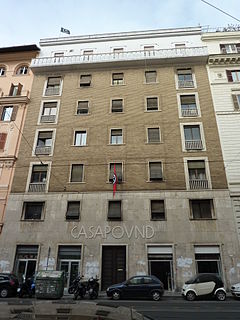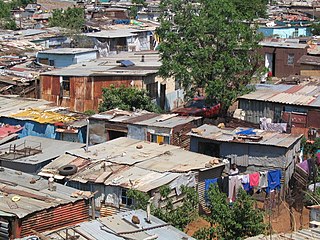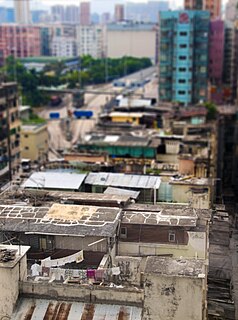 W
WSquatting is the action of occupying an abandoned or unoccupied area of land or a building, usually residential, that the squatter does not own, rent or otherwise have lawful permission to use. Author Robert Neuwirth suggested in 2004 that there were one billion squatters globally.
 W
WFar-right social centres are spaces inspired by neo-fascist and Third Position ideas. In Spain, Hogar Social Ramiro Ledesma was squatted in the Tetuán district in Madrid in August 2014. It was quickly evicted the next month and the group then occupied a building in Chamberí. Some members of the group then split off and attacked the second building, which was also evicted. Social Bastion was a French neo-fascist political movement that used squatting as a tactic before being banned as a far-right organization in 2019 by the French Government. Members of the student association GUD, squatted a building at 18 rue Port-du-Temps in Lyon, in May 2017. They planned it to help only poor French nationals. The mayor of Lyon Gérard Collomb immediately condemned the occupation and pledged to evict it. It was evicted by 100 police officers after two weeks.
 W
WThe Good Terrorist is a 1985 political novel written by the British novelist Doris Lessing. The book's protagonist is the naïve drifter Alice, who squats with a group of radicals in London and is drawn into their terrorist activities.
 W
WIllegal housing in India consists of huts or shanties built on land not owned by the residents and illegal buildings constructed on land not owned by the builders or developers. Although illegal buildings may afford some basic services, such as electricity, in general, illegal housing does not provide services that afford for healthy, safe environments.
 W
WInformal housing or informal settlement can include any form of housing, shelter, or settlement which is illegal, falls outside of government control or regulation, or is not afforded protection by the state. As such, the informal housing industry is part of the informal sector.
 W
WInfoshops are places in which people can access anarchist or autonomist ideas. They are often stand-alone projects, or can form part of a larger radical bookshop, archive, autonomous social centre or community centre. Typically, infoshops offer flyers, posters, zines, pamphlets and books for sale or donation. Other items such as badges, locally produced artworks and T-shirts are also often available. Infoshops can also provide printing and copying facilities for people to produce their own literature or have a meeting space.
 W
WA komboni is a type of informal housing compound or shanty town common to Zambia, particularly the capital city of Lusaka. It is characterized by a low income and a high population density. Kombonis typically began as housing for employees of a particular company, estate, or mine. An estimated 35% of Zambians live in urban areas, and kombonis exist in many of them. It is estimated that 80% of the population of Lusaka live and work in these areas.
 W
WThe Legal Aid, Sentencing and Punishment of Offenders Act 2012 (LASPO) is a statute of the Parliament of the United Kingdom, creating reforms to the justice system. The bill for the act was introduced in the House of Commons on 21 June 2011, and received Royal Assent on 1 May 2012.
 W
WRooftop slum or penthouse slum generally refers to illegal housing on the rooftops of apartment buildings. In Hong Kong, some people are unable to afford traditional apartments and are forced to wait years for affordable public housing. They therefore live in squatted shacks on top of buildings. According to the Hong Kong population census, there were 47,091 rooftop dwellers in 2011 and this number is likely to have dropped as working class areas are redeveloped.
 W
WA shanty town or squatter area is a settlement of improvised buildings known as shanties or shacks, typically made of materials such as mud and wood. A typical shanty town is squatted and in the beginning lacks adequate infrastructure, including proper sanitation, safe water supply, electricity and street drainage. Over time, shanty towns can develop their infrastructure and even change into middle class neighbourhoods. They can be small informal settlements or they can house millions of people.
 W
WA suburb is a mixed-use or residential area, existing either as part of a city or urban area or as a separate residential community within commuting distance of a city. Suburbs might have their own political jurisdiction, especially in the United States, but this is not always the case, especially in the United Kingdom where most suburbs are located within the administrative boundaries of cities. In most English-speaking countries, suburban areas are defined in contrast to central or inner-city areas, but in Australian English and South African English, suburb has become largely synonymous with what is called a "neighborhood" in other countries and the term extends to inner-city areas. In some areas, such as Australia, India, China, New Zealand, the United Kingdom, and parts of the United States and Canada, new suburbs are routinely annexed by adjacent cities. In others, such as Morocco, France, and much of the United States and Canada, many suburbs remain separate municipalities or are governed as part of a larger local government area such as a county. In the United States, beyond the suburbs are exurbs, or "exurban areas", with less density but linked to the metropolitan area economically and by commuters.
 W
WTrans Europe Halles (TEH) is a European-based network of cultural centres initiated by citizens and artists.